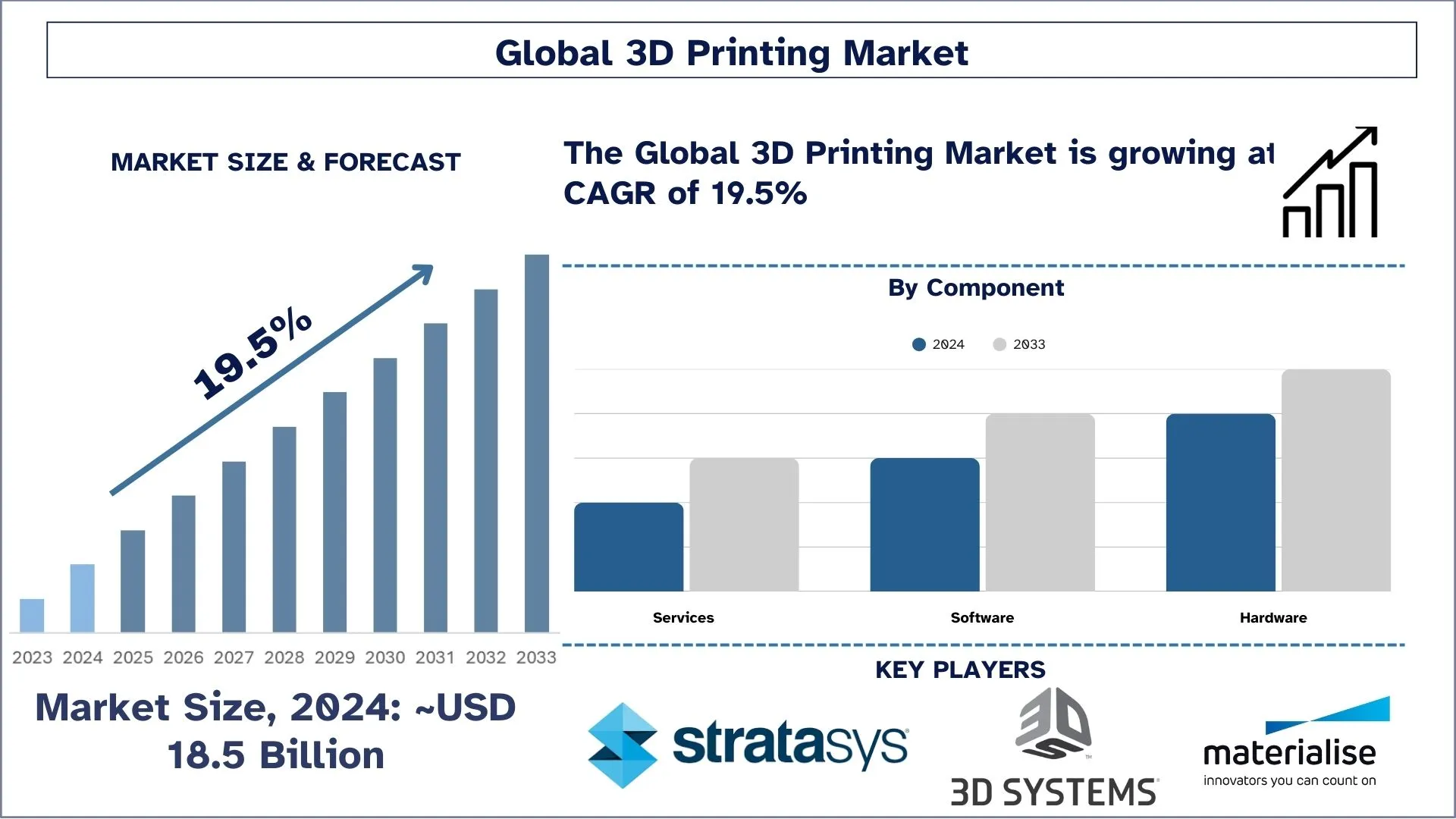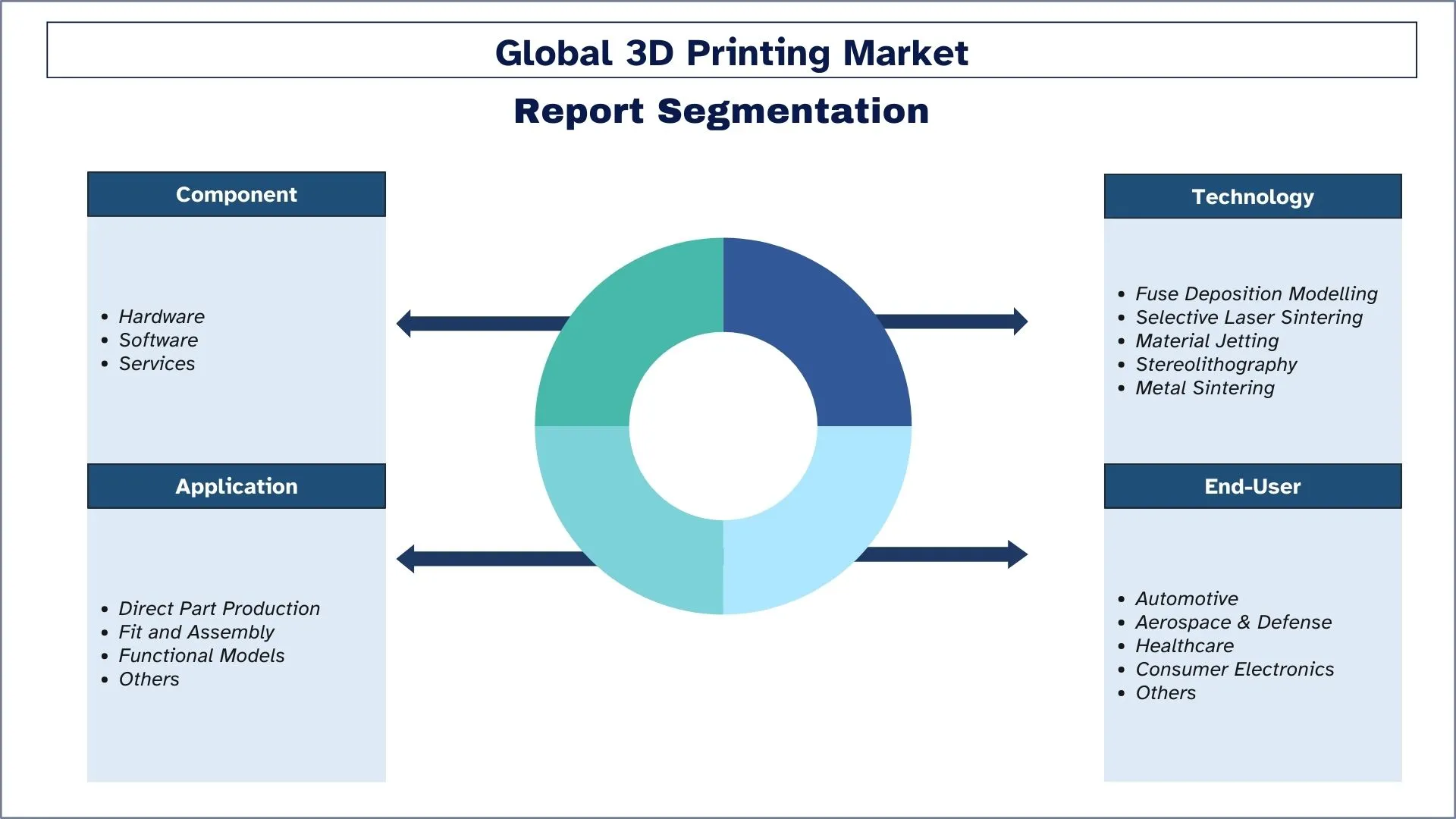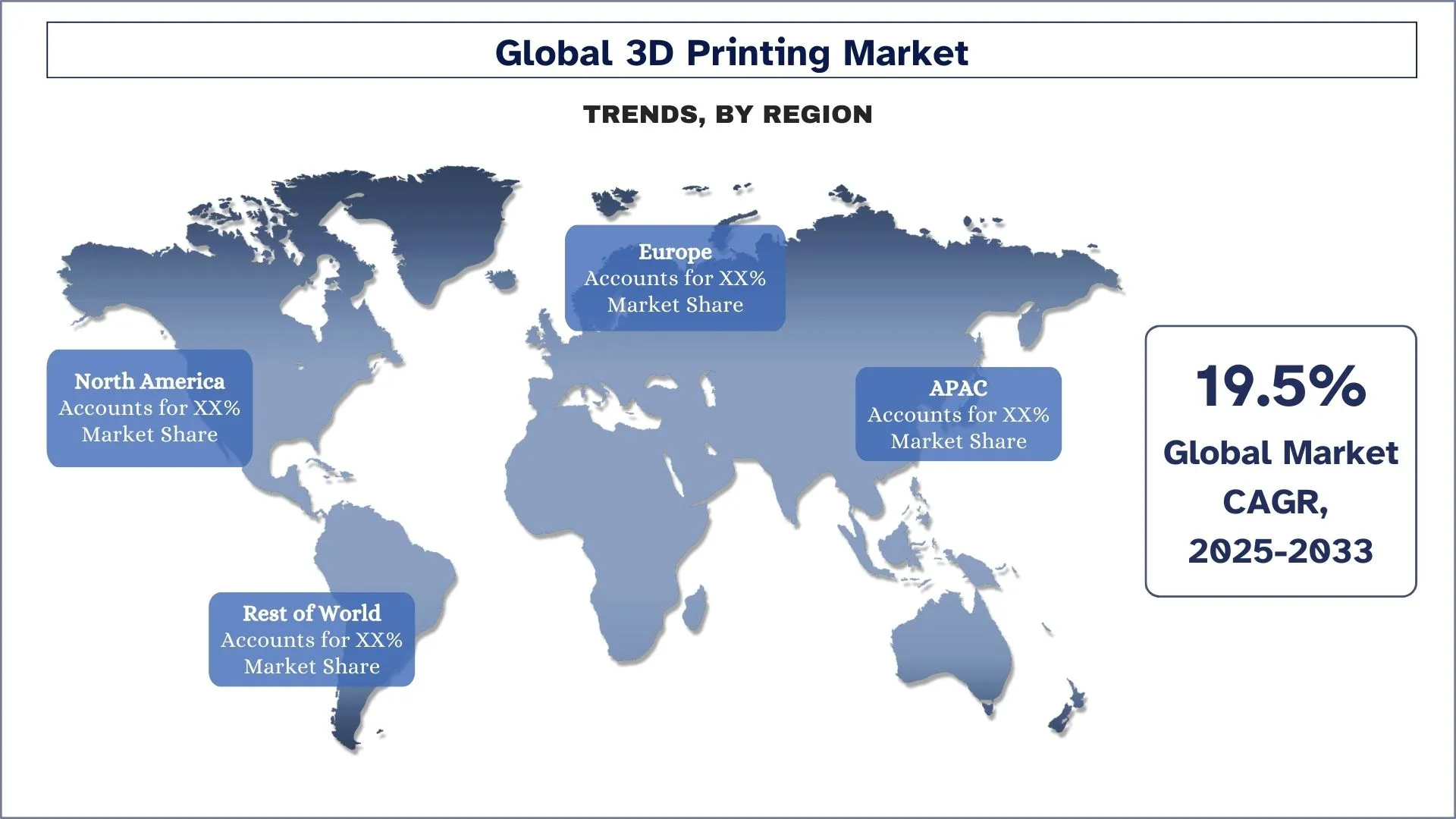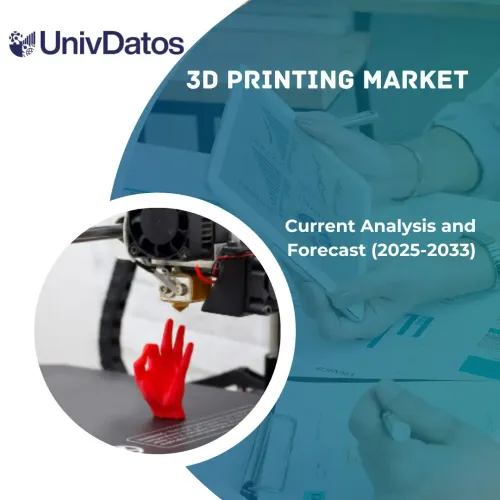- Home
- About Us
- Industry
- Services
- Reading
- Contact Us
3D Printing Market: Current Analysis and Forecast (2025-2033)
Emphasis on Component ((Product (Professional/Industrial Printer, Personal/Desktop 3D Printers), Material (Polymer, Plastic, Metals and Alloys, Ceramic, Other Materials), Technology ( Stereolithography, Selective Laser Sintering, Electron Beam Melting, Fused Deposition Modelling, Laminated object Manufacturing, Other Technologies))

3D Printing Market Size & Forecast
The 3D Printing market was valued at approximately USD 18.5 billion in 2024 and is expected to grow at a substantial CAGR of around 19.5% during the forecast period (2025-2033), owing to the advancements in materials and technologies.
3D Printing Market Analysis
The increasing demand for 3D printing is also driven by its long-term cost-effectiveness, customization, speed, flexibility, and sustainability. As technology continues to improve and new applications are discovered, the demand for 3D printing is likely to continue to grow. 3D printing allows for the creation of unique and customized products, which is particularly appealing to consumers who want personalized items. Further on, 3D printing allows to produce complex shapes and geometries, which can be difficult or impossible to achieve using traditional manufacturing methods. Also, it can reduce waste and the carbon footprint of production, as it only uses the exact amount of material needed to produce a given object.
3D Printing Market Trends
This section discusses the key market trends influencing the various segments of the 3D printing market as identified by our research experts.
Growth of Customization and On-Demand Manufacturing in 3D Printing
The modern 3D printing market concentrates on customized production together with real-time manufacturing, which enables businesses to create specific products and minimal-production batch sequences efficiently. Companies operating within the healthcare and automotive industries, along with fashion businesses, use these capabilities to develop customized solutions that produce fewer product inefficiencies and enable faster manufacturing cycles. Industry growth occurs because manufacturers now achieve customer-targeted solutions and reduced inventory expenses simultaneously.
3D Printing Market Industry Segmentation
This section provides an analysis of the key trends in each segment of the global 3D Printing market report, along with forecasts at the global, regional, and country levels for 2025-2033.
The Fuse Deposition Modeling Segment is Expected to Witness a Higher CAGR than the 3D Printing Market.
By technology, the market is segmented into fused deposition modeling, selective laser sintering, material jetting, stereolithography, and metal sintering. The fuse deposition modeling segment captured more than 50% share of the 3D Printing market in 2024, owing to the extensive adoption of the technology across various 3D printing processes. Further, the growing demand from aerospace and defense, healthcare, and automotive verticals would open opportunities for the adoption of these technologies.
The Functional Model Segment Holds the Largest Share of the Market.
Based on application, the market is classified into direct part production, fit and assembly, functional models, and others. The functional model application held a commendable share of the 3D printing market in 2024 and is expected to grow at a substantial CAGR during the forecasted period due to the rising adoption of the functional modelling process across several industry verticals. The automotive and aerospace, and defense verticals particularly use functional models to design and develop parts, components, and complex systems precisely.

North America has a significant share of the market in 2024.
3D printing technology has gained vastly in prominence over traditional manufacturing methods in North America due to its efficiency and high precision rate. Considering the rapid growth prospects of the region in every aspect, the region continued to dominate the 3D industry in terms of market share in 2024. Furthermore, the growth in the region can also be attributed to efficient utilization of materials, time, and cost efficiency, the drastic surge in customization of 3D solutions, and burgeoning technical upgradation, coupled with the region’s economic potential to make consistent investments in emerging economies.
U.S. Dominates the North American 3D Printing Market
The United States 3D printing market is growing quickly due to manufacturing advancements in additive technologies, together with rising needs for fast prototyping and customer-specific manufacturing. The market leadership group includes 3D Systems, Stratasys, and HP, which continuously advance the boundaries of 3D printing technologies, including bioprinting and metal printing capabilities. The U.S. also benefits from a strong industrial base and ongoing investments in innovation across industries such as aerospace, healthcare, and automotive. This expansion will keep driving forward because an increasing number of businesses are implementing 3D printing applications for their production needs and distribution workflows.

3D Printing Market Industry Competitive Landscape
The 3D Printing market is competitive, with several global and international players. The key players are adopting different growth strategies to enhance their market presence, such as partnerships, agreements, collaborations, new product launches, geographical expansions, and mergers and acquisitions.
Top 3D Printing Market Companies
Some of the major players operating in the market are Stratasys, Materialise, ENVISIONTEC US LLC; 3D Systems, Inc.; GENERAL ELECTRIC; Autodesk Inc.; Canon Inc.; voxeljet AG; HP Development Company, L.P.; and ExOne.
Recent Developments in the 3D Printing Market
In March 2023, 3D Systems, Inc. announced the launch of NextDent Cast and NextDent Base, two new printing materials, and NextDent LCD1, a printing platform. The materials are designed to enhance material properties, and the printing platform is an easy-to-use, small-format printer. With these launches, the company aimed to aid its customers in accelerating additive manufacturing adoption.
In November 2023, Autodesk Inc. announced the launch of Autodesk AI. This new technology is available in Autodesk products and is designed to provide customers with generative capabilities and intelligent assistance. With the launch of this new technology in Autodesk products, the company aimed to minimize errors by automating repetitive tasks and the needs of its customers.
3D Printing Market Report Coverage
Details | |
Base year | 2024 |
Forecast period | 2025-2033 |
Growth momentum | Accelerate at a CAGR of 19.5% |
Market size 2024 | USD 18.5 Billion |
Regional analysis | APAC, Europe, Asia-Pacific, Rest of the World |
Major contributing region | North America is expected to grow at the highest CAGR during the forecasted period. |
Key countries covered | U.S., Canada, Germany, France, UK, Spain, Italy, China, Japan, and India |
Stratasys; Materialise; ENVISIONTEC US LLC; 3D Systems, Inc.; GENERAL ELECTRIC; Autodesk Inc.; Canon Inc.; voxeljet AG; HP Development Company, L.P.; and ExOne | |
Report Scope | Market Trends, Drivers, and Restraints; Revenue Estimation and Forecast; Segmentation Analysis; Demand and Supply Side Analysis; Competitive Landscape; Company Profiling |
Segments Covered | By Component, By Technology, By Application, By End-User, By Region/Country |
Reasons to Buy the 3D Printing Market Report:
The study includes market sizing and forecasting analysis validated by authenticated key industry experts.
The report presents a quick review of overall industry performance at a glance.
The report covers an in-depth analysis of prominent industry peers with a primary focus on key business financials, product portfolios, expansion strategies, and recent developments.
Detailed examination of drivers, restraints, key trends, and opportunities prevailing in the industry.
The study comprehensively covers the market across different segments.
Deep dive regional-level analysis of the industry.
Customization Options:
The global 3D Printing market can be customized further as per the requirements or any other market segment. Besides this, UnivDatos understands that you may have your own business needs; hence, feel free to contact us to get a report that completely suits your requirements.
Table of Content
Research Methodology for 3D Printing Market Analysis (2023-2033)
We analyzed the historical market, estimated the current market, and forecasted the future market of the global 3D Printing Market to assess its application in major regions worldwide. We conducted exhaustive secondary research to gather historical market data and estimate the current market size. To validate these insights, we carefully reviewed numerous findings and assumptions. Additionally, we conducted in-depth primary interviews with industry experts across the 3D Printing Market value chain. After validating market figures through these interviews, we used top-down and bottom-up approaches to forecast the overall market size. We then employed market breakdown and data triangulation methods to estimate and analyze the market size of industry segments and sub-segments.
Market Engineering
We employed data triangulation techniques to finalize the overall market estimation and derive precise statistical numbers for each segment and sub-segment of the global 3D Printing Market. We split the data into several segments and sub-segments by analyzing various parameters and trends, including component, technology, application, end-user, and regions within the global 3D Printing Market.
The main objective of the Global 3D Printing Market Study
The study identifies current and future trends in the global 3D Printing Market, providing strategic insights for investors. It highlights regional market attractiveness, enabling industry participants to tap into untapped markets and gain a first-mover advantage. Other quantitative goals of the studies include:
Market Size Analysis: Assess the current and forecast market size of the global 3D Printing Market and its segments in terms of value (USD).
3D Printing Market Segmentation: The study segments the market by component, technology, application, end-user, and region.
Regulatory Framework & Value Chain Analysis: Examine the regulatory framework, value chain, customer behavior, and competitive landscape of the 3D Printing Market industry.
Regional Analysis: Conduct a detailed regional analysis for key areas such as Asia Pacific, Europe, North America, and the Rest of the World.
Company Profiles & Growth Strategies: Company profiles of the 3D Printing Market and the growth strategies adopted by the market leaders to sustain the fast-growing market.
Frequently Asked Questions FAQs
Q1: What is the 3D Printing market's current size and growth potential?
As of 2024, the global 3D Printing market is valued at approximately USD 18.5 billion and is projected to grow at a CAGR of 19.5% through 2033.
Q2: What are the driving factors for the growth of the 3D Printing market?
Growth in the 3D printing market is driven by innovations in materials like metal alloys and biocompatible substances, and advancements in faster printing technologies for various industries.
Q3: Which market has the largest share of the 3D Printing market by Technology?
The Fuse Deposition Modelling category dominates the global 3D Printing market by Technology segment.
Q4: What are the major trends in the 3D Printing market?
The trend toward customized and on-demand manufacturing is growing, with industries producing tailored products more efficiently, reducing waste, and speeding up production cycles.
Q5: Which region will dominate the 3D Printing market?
The North America region currently dominates the global 3D Printing market.
Q6: What are the biggest challenges in the 3D Printing market?
The high costs of 3D printers and specialized materials remain a challenge for businesses, particularly small and medium-sized companies, limiting widespread adoption.
Q7: Who are the Top players in the global 3D Printing market?
The leading companies driving innovation in the 3D Printing market include:
• Abbott Laboratories
• BD
• Biomerieux SA
• Danaher Corporation
• Hologic, Inc.
• Qiagen
• Roche
• Siemens Healthineers AG
• Sysmex Corporation
• Thermo Fisher Scientific
Q8: How is 3D printing impacting supply chain management?
3D printing is transforming supply chain management by enabling on-demand production and reducing the need for extensive inventory. Businesses can produce parts and products as needed, minimizing storage costs and lead times. This technology also allows for the rapid localization of production, reducing dependence on global supply chains and enhancing resilience during disruptions, such as those caused by pandemics or geopolitical events.
Q9: What role does 3D printing play in the medical field?
In the medical field, 3D printing is revolutionizing areas such as prosthetics, implants, and surgical planning. It allows for the creation of customized prosthetics and implants tailored to individual patients, improving outcomes. Additionally, it is used for creating patient-specific models for surgical planning, making surgeries more precise. Bioprinting, the printing of biological tissues, is also a growing area with the potential for creating organ structures in the future.
Related Reports
Customers who bought this item also bought










